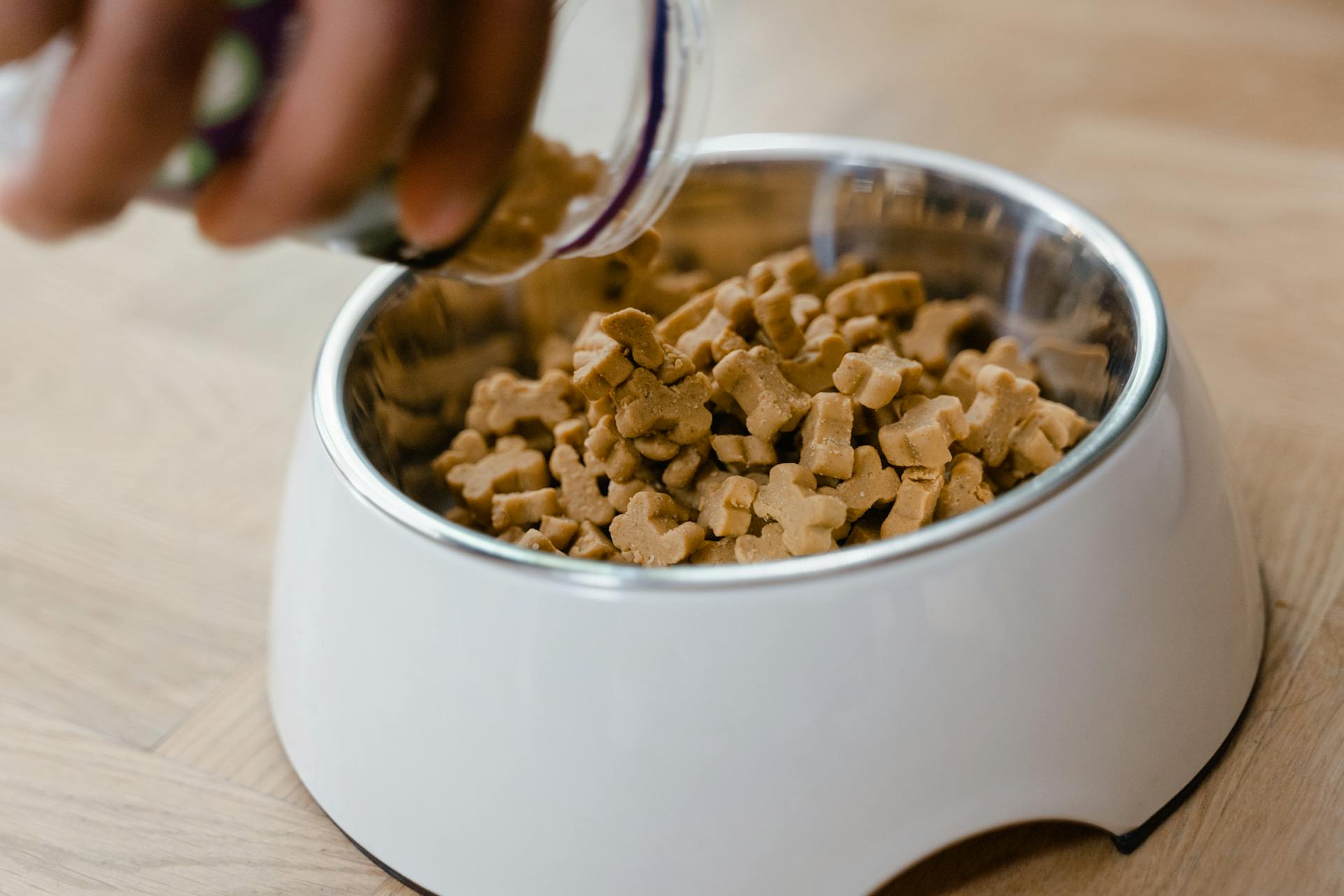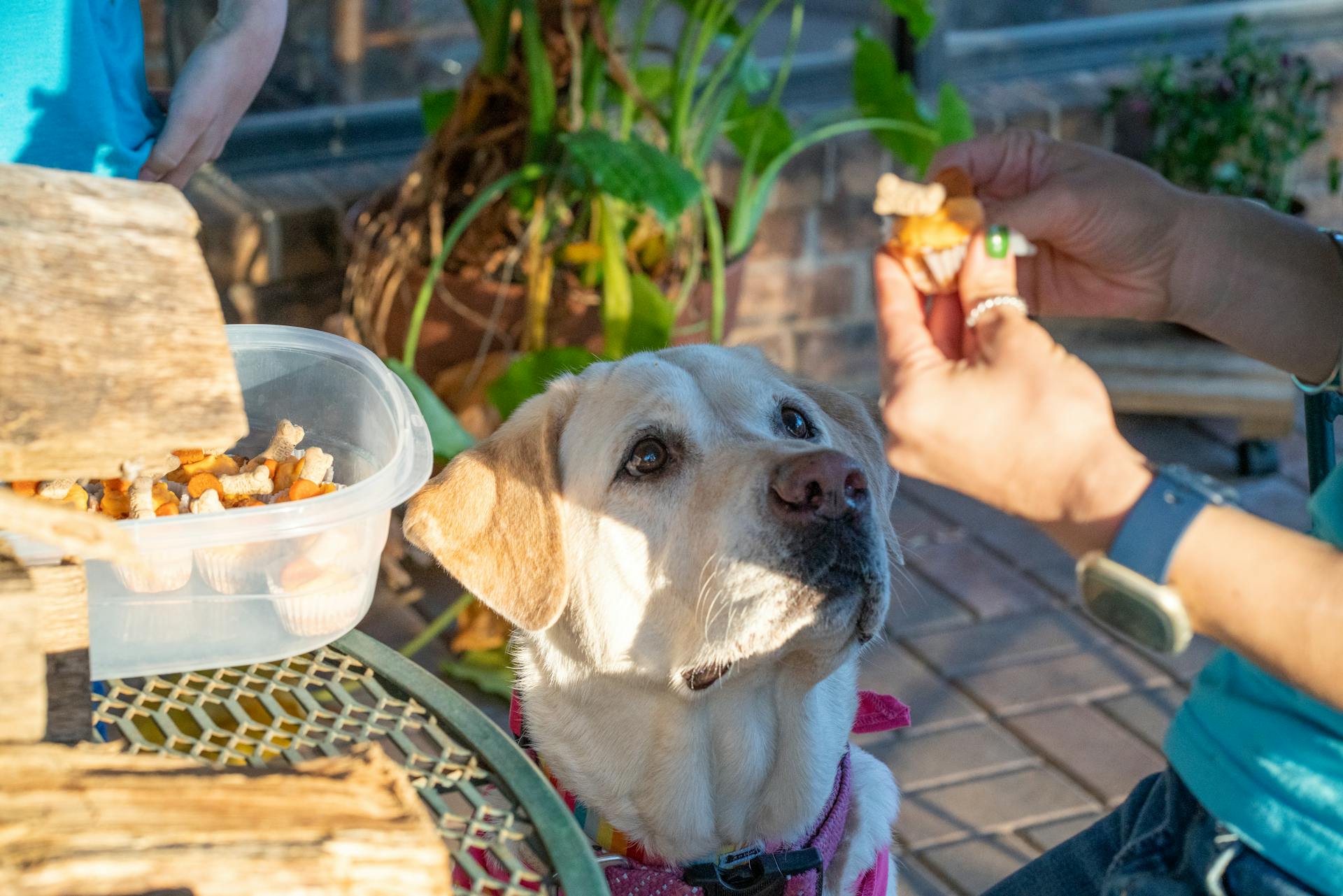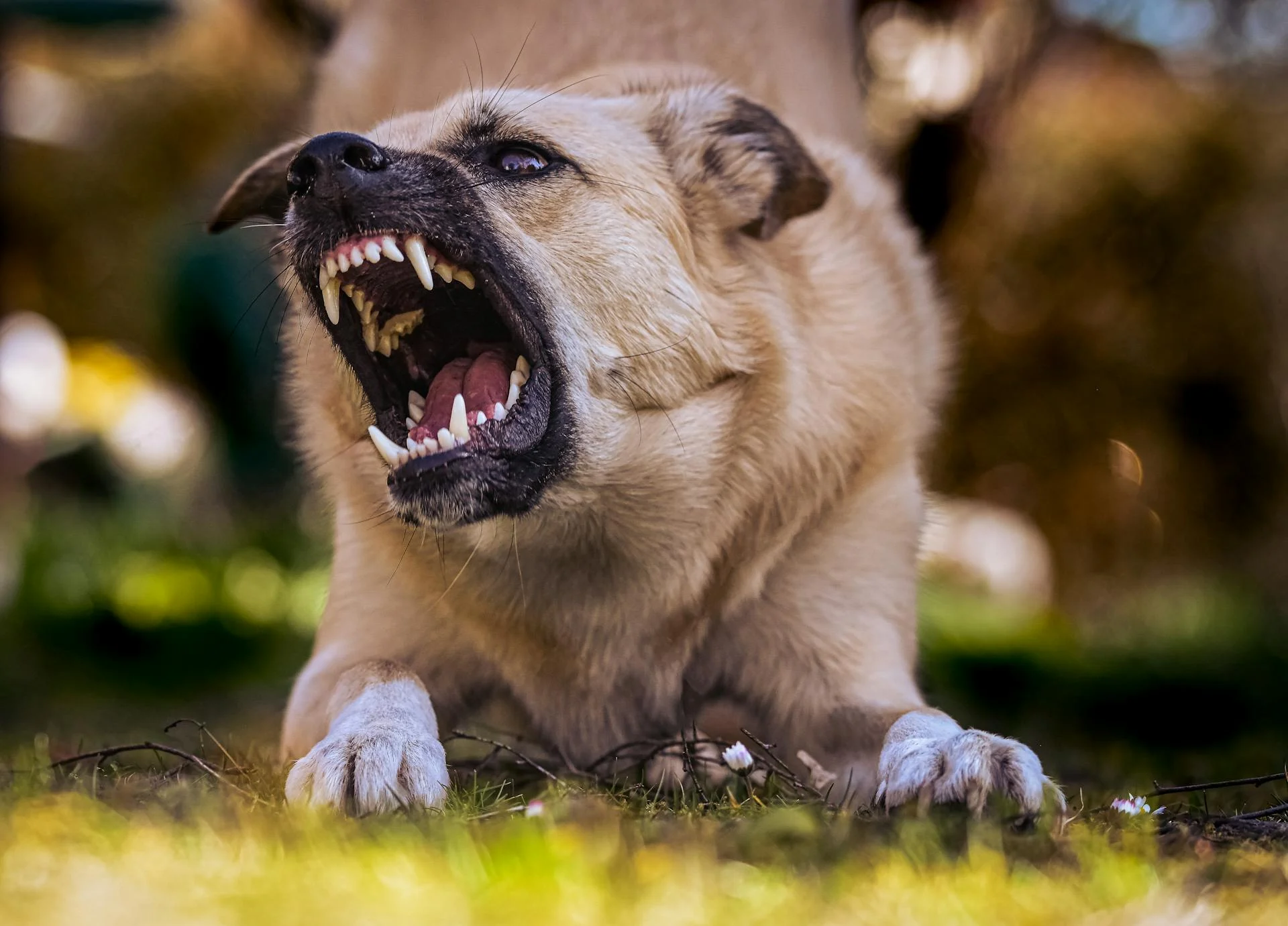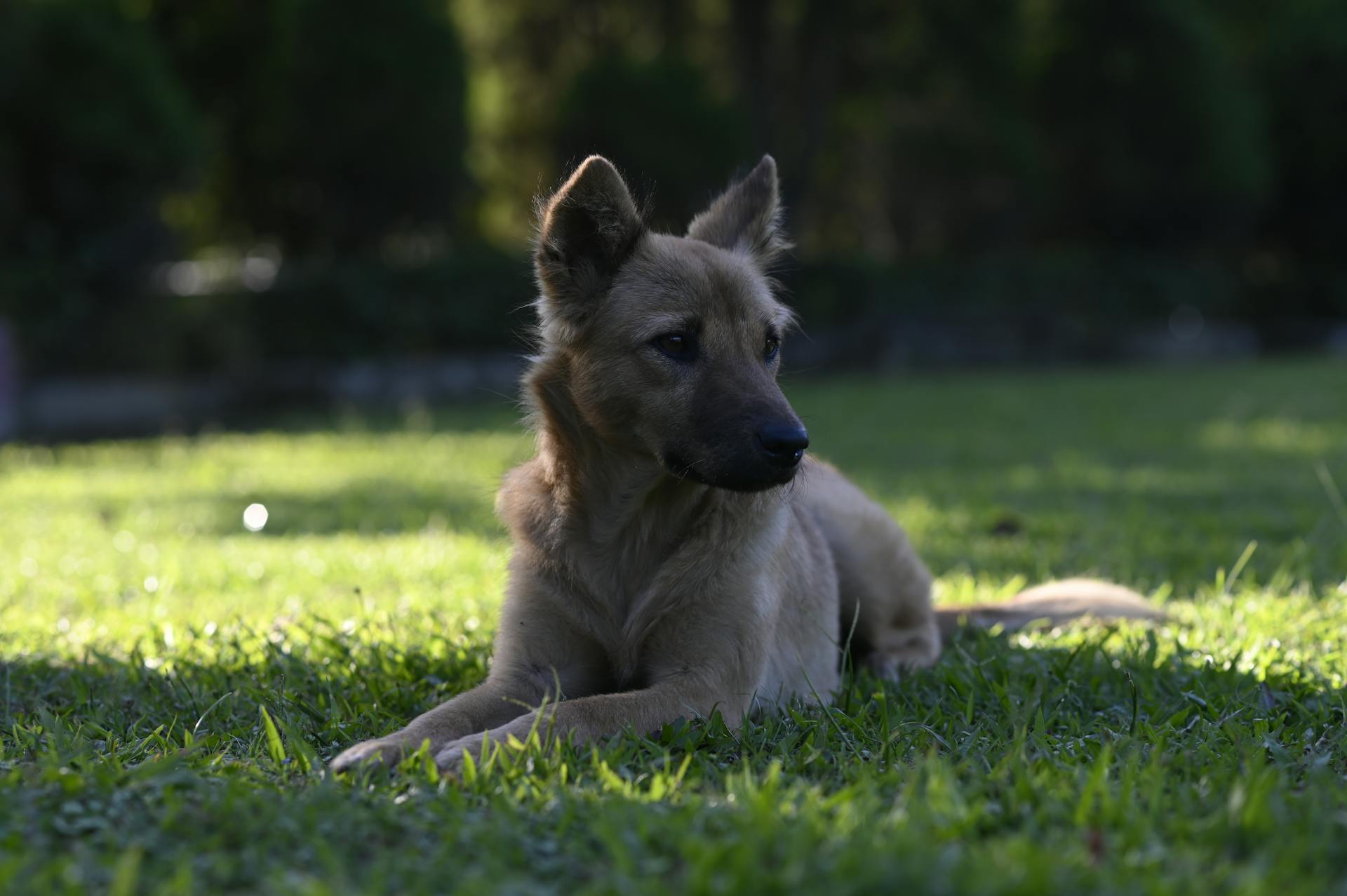
Butylated hydroxyanisole, or BHA, is a common preservative found in many dog treats. It's a chemical that helps prevent spoilage and extend shelf life.
BHA is classified as a known animal carcinogen by the International Agency for Research on Cancer. This means it has been shown to cause cancer in animals.
The FDA has approved BHA for use in human food and animal feed, but some studies suggest it may be toxic to dogs in large quantities.
Dangers of BHA in Dog Treats
BHA, a chemical preservative, is found in many dog treats and has been linked to cancer and reproductive disorders in multiple studies.
Government regulations still allow the use of BHA in pet food, but it's considered safe in low doses. However, why take the risk?
Cumulative exposure to BHA can magnify its effect on an animal's body, making dogs more susceptible to its negative impacts.
Some dog foods and treats contain artificial preservatives like BHA, ethoxyquin, and butylated hydroxytoluene (BHT) to prevent spoilage.
These preservatives can negatively impact protein digestion, enzyme production, metabolism, and gut homeostasis in dogs.
In fact, BHA and BHT have been used since the 1940s and 1950s, but they've been called out for causing tumors and potentially being carcinogens.
The National Toxicology Program warns that BHA should be "reasonably anticipated" to be a cancer-causing chemical in humans.
BHA has also been found to produce malignant tumors in laboratory animals, and the State of California includes it on its "Chemicals Known... to Cause Cancer or Reproductive Toxicity" report.
There are safer natural preservatives available, such as tocopherols and ascorbic acid, which can be found in many quality dog foods.
Here's a list of some common artificial preservatives found in dog food:
- BHA (butylated hydroxyanisole)
- Ethoxyquin
- BHT (butylated hydroxytoluene)
By choosing dog foods that use natural preservatives, you can reduce the risk of BHA-related health issues in your furry friend.
Alternatives to BHA
Artificial chemical preservatives like BHA can make a product more profitable for the pet food company, but they can also make the food more dangerous for our dogs.
Using natural preservatives can be a safer alternative. Many pet foods are preserved with antioxidants, which are super-safe natural preservatives.
Ascorbic acid (vitamin C) and mixed tocopherols (vitamin E) are two examples of natural preservatives that are safer for our dogs.
These natural preservatives can be just as effective as BHA in extending the shelf life of dog food.
BHA in Dog Food
BHA, or butylated hydroxyanisole, is a chemical preservative found in many dog foods. It's been linked to cancer and reproductive disorders in multiple studies.
While government regulations allow its use in pet food, it's considered safe in low doses. But why take the risk?
BHA is a common artificial preservative used to prevent the fats in dog food from going rancid, which can make your dog sick. It's often found in dog foods and treats, along with other preservatives like ethoxyquin and butylated hydroxytoluene (BHT).
Some of the potential negative impacts of BHA on your dog's health include:
- Protein digestion issues
- Enzyme production problems
- Metabolism issues
- Gut homeostasis disruptions
BHT in Dog Food
BHA and BHT are often used together in dog food as antioxidant preservatives. They slow the oxidation of fats and oils, preventing spoilage.
Some commercial dog foods include a self-sealing bag to keep the food fresh and prevent oxidation. However, adding oxygen scavengers or including food preservatives like BHA and BHT can also be effective.
BHA and BHT have been used in dog food since the 1940s and 1950s. They're a synthetic alternative to natural antioxidants like vitamin C and vitamin E.
If you're concerned about the potential risks of BHA and BHT, look for dog foods that use natural alternatives like tocopherols and ascorbic acid instead.
Cumulative Feeding
The more we feed our dogs products containing BHA and BHT, the more likely they are to suffer ill effects. This is because cumulative feeding allows for repeated exposure to these ingredients.
We give our dogs food with BHA and BHT two or three times a day, every day. This regular feeding schedule means our dogs are constantly being exposed to these potentially toxic chemicals.
The dog has no choice but to eat what we feed it, making cumulative feeding a significant concern.
Regulations and Controversy

BHA in dog treats has sparked controversy due to its potential health risks. The European Union considers BHA a 'hormone disruptor', which has led to its ban in certain food products.
Dogs, unlike humans, are typically fed the same food continuously, making them more susceptible to the effects of BHA. Studies have shown that BHA can damage the sperm quality of male rats and the sex organs of females.
The FDA has a position on BHA, but not everyone agrees it's safe for consumption. The National Institute of Health has declared BHA a possible carcinogen, which is a concern for many pet owners.
You might like: Health Certificate
Banned Internationally
The European Union considers BHA a 'hormone disruptor' due to studies showing it can damage the sperm quality of male rats and the sex organs of females.
BHA has been banned from use in certain food products within the European Union as a result.
Unlike humans, dogs are typically fed the same food continuously, which could potentially expose them to higher levels of BHA over time.
This makes it even more concerning that BHA has been linked to potential health risks.
Not Everyone Agrees

Some experts and groups disagree with the FDA's stance on BHA and BHT.
The National Institute of Health has declared that BHA can be "reasonably anticipated to be a human carcinogen."
Studies have shown that BHA is a possible carcinogen, sparking concerns about its safety.
More and more groups and individuals are speaking out against the use of BHA and BHT in food products.
FDA Approved for Human Consumption
FDA approval doesn't necessarily mean something is safe for all living beings. The FDA has designated BHA and BHT as safe for human consumption in limited quantities.
However, this doesn't mean they're safe for animals. Garlic, for example, is considered toxic to dogs.
It's essential to understand that FDA approval is specific to human consumption, not animal consumption.
You might enjoy: Snapdragons Safe
Other Synthetic Preservatives
BHA and BHT are not the only synthetic preservatives that can be detrimental to your dog's health. Propylene glycol, a synthetic preservative, is another offender that could be causing cumulative damage to your dog.
Artificial food colorings are also something to look out for, as they can have adverse effects on your dog's health.
Some other synthetic preservatives to watch out for are listed below:
- Propylene glycol
- Artificial food colorings
It's worth noting that while corn syrup is a natural ingredient, it's often used as a cheap filler in dog foods, which can lead to health problems such as diabetes and hyperactivity.
Other Synthetic Preservatives
BHA and BHT are two of the worst offenders when it comes to synthetic preservatives, but there are other culprits you should be aware of.
BHA and BHT have been used since the 1940s and 1950s, and they're not the only synthetic preservatives out there. Propylene glycol is another one to watch out for.
Propylene glycol has been linked to potential health issues in dogs, including cancer, liver and kidney damage, and developmental problems. It's also present in human foods, such as dry cereals and margarine.
Artificial food colorings are another synthetic preservative to be cautious of. They're used to make food look more appealing, but they can have negative effects on your dog's health.
Some common artificial food colorings include Red 40, Yellow 5, and Blue 1. These colorings have been linked to potential health issues in dogs, including allergic reactions and hyperactivity.
Here are some common synthetic preservatives to avoid in your dog's food:
- Propylene glycol
- Artificial food colorings (Red 40, Yellow 5, Blue 1)
- Corn syrup (excessive consumption can increase likelihood of diabetes and cause hyperactivity)
Checking the ingredient list on your dog's food is crucial to ensuring their health and well-being. Look out for these synthetic preservatives and choose dog food with natural preservatives instead.
Unacceptable Types
BHA and BHT are two of the worst offenders when it comes to synthetic preservatives, but they're not the only culprits. Propylene glycol, a common ingredient in antifreeze, is also found in some dog foods.
Some artificial food colorings, like red 40, have been associated with hyperactivity and various biochemical effects within the body. Dogs don't need vibrant visual appeal to be healthy, and many brands are now avoiding artificial food dyes.
Here are a few unacceptable types of preservatives you should avoid:
- BHA and BHT, linked to cancer
- Propyl Gallate, linked to several dangerous health issues in dogs
- Propylene Glycol, an antifreeze ingredient
- Ethoxyquin, a pesticide linked to cancer
- TBHQ, linked to stomach tumors in lab animals
- Sodium Metabisulphite, a bleaching agent
- Food Dyes, linked to cancers, behavior problems, and hypersensitivity in dogs and humans
Frequently Asked Questions
Is BHA preservative safe?
BHA preservative is safe to consume in the recommended dose, but long-term effects at higher doses are still being researched. More information is available on the FDA's guidelines and ongoing scientific studies.
What is BHA and why you should avoid it?
BHA is a chemical preservative linked to endocrine disruption and organ-system toxicity, commonly found in personal care products and foods. Avoiding BHA can help minimize potential health risks, but more information on its effects and alternatives is available.
Sources
- BHA -- Does Your Dog's Food Contain This Cancer- ... (dogfoodadvisor.com)
- Recognizing Unsafe Dog Food Ingredients (autumntrailsvet.com)
- Dangerous Preservatives In Dog Treats You Should Avoid (justjerkytreats.com)
- Dog Treats Going Moldy Is a Good Thing. No, Really! (animalwellnessmagazine.com)
- BHA and BHT: Dog Food Ingredients to Avoid (dogster.com)
Featured Images: pexels.com


